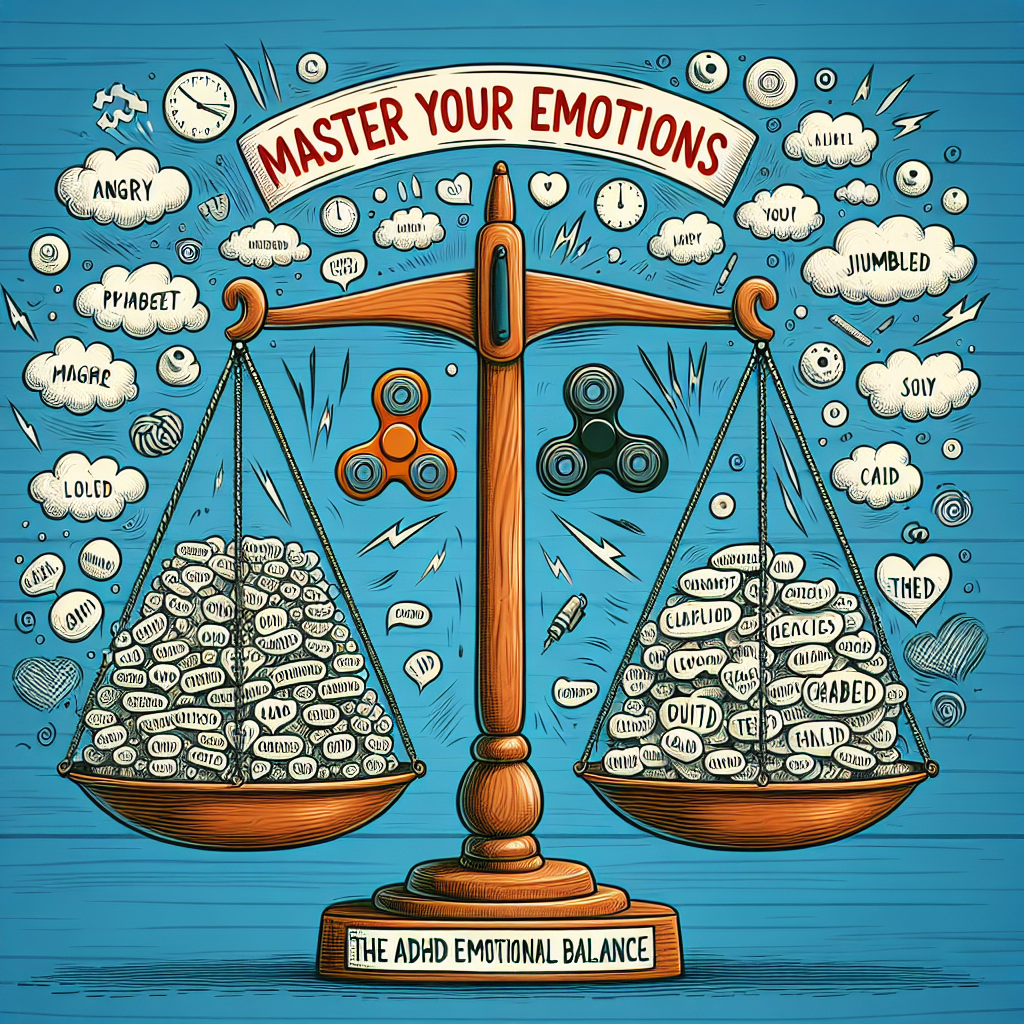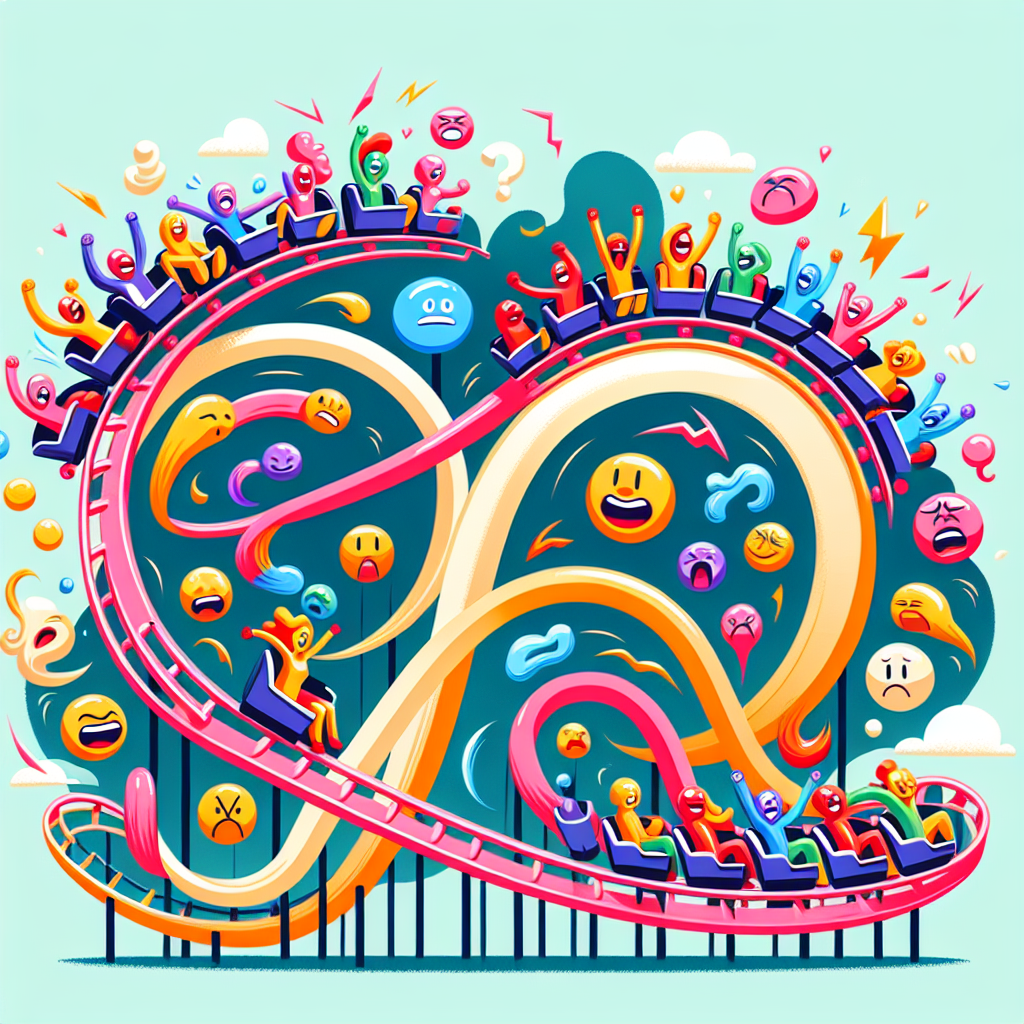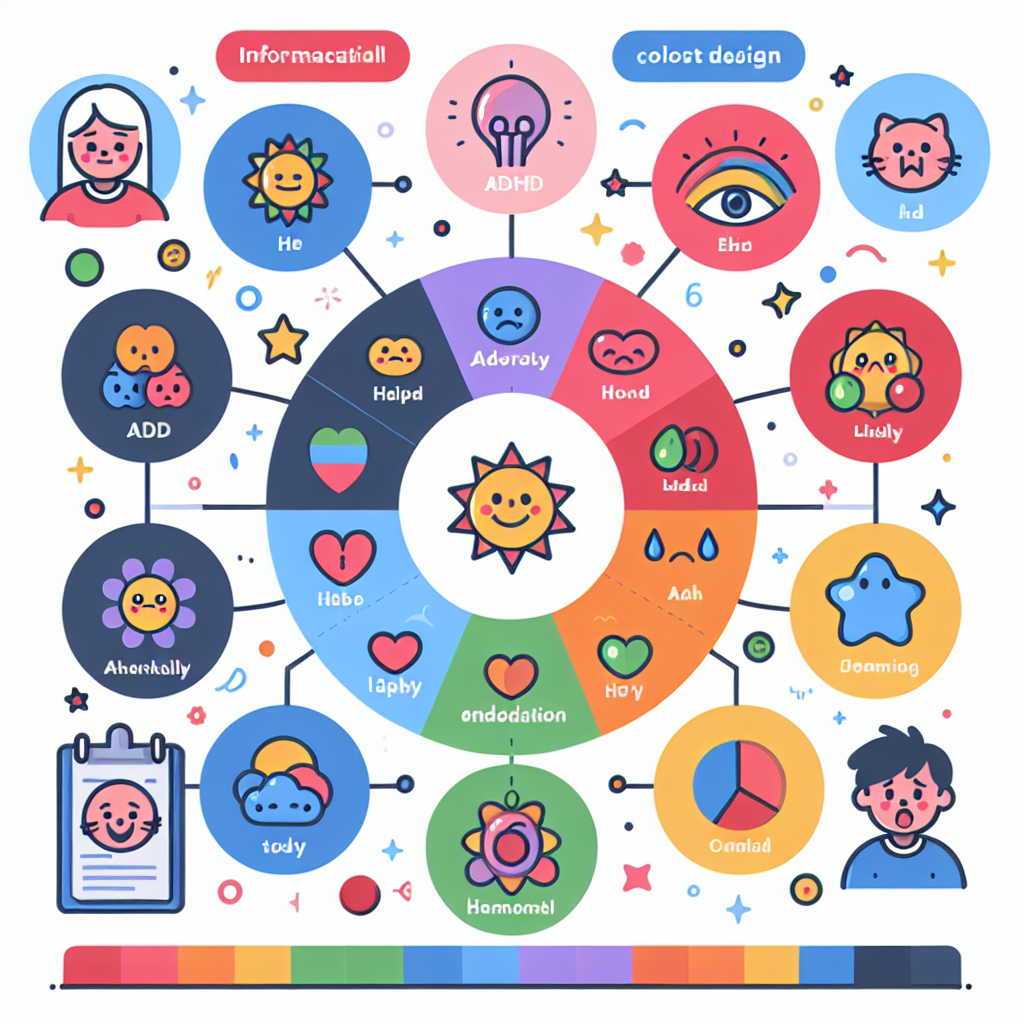
Master Your Emotions: The ADHD Guide to Emotional Balance
Introduction
Welcome to the wild, wonderful world of emotions especially when you throw ADHD into the mix. If you’ve ever felt like your feelings are on a roller coaster ride, you’re not alone! Many individuals with ADHD experience emotional dysregulation, which can feel like trying to tame a tornado with a toothpick. But fear not! In this guide, we’re diving deep into ADHD emotional regulation to help you find your emotional balance.
First off, let’s clear up a common misconception: having ADHD doesn’t mean you can’t manage your emotions. Instead, it means that the emotions can feel more intense and harder to control. Think of it as having a supercharged emotional engine when it runs smoothly, it’s fantastic, but when it sputters, it can lead to some serious emotional outbursts.
In this blog post, we’ll explore practical strategies for managing emotions with ADHD, including understanding those pesky mood swings and impulsivity that can throw you off course. We’ll also cover how to build emotional resilience and coping mechanisms that make handling stress feel less like climbing Mount Everest.
So buckle up as we embark on this journey towards mastering your emotions! Whether you’re an adult navigating relationships or a parent teaching kids emotion regulation techniques, there’s something here for everyone. Let’s get started!

Understanding ADHD and Emotions
When we talk about ADHD emotional regulation, we’re diving into a world where feelings can feel like a rollercoaster ride thrilling, unpredictable, and sometimes downright dizzying! Emotional dysregulation in ADHD isn’t just a fancy term; it’s the reality for many who navigate this condition. But what does it really mean?
Defining Emotional Dysregulation in ADHD
Emotional dysregulation refers to difficulties in managing emotional responses. Individuals with ADHD often experience intense emotions, leading to challenges in controlling reactions think of it as having a volume knob stuck on high. This can manifest as sudden outbursts or prolonged periods of frustration that seem disproportionate to the situation at hand.
The Connection Between ADHD and Feelings
For those with ADHD, feelings are not just experienced; they are felt deeply. The connection between ADHD and feelings is akin to how a chef might mix spices too much of one can overwhelm the dish. Similarly, individuals may find themselves overwhelmed by emotions like anger or joy, making it tricky to navigate daily life.
Common Emotional Challenges Faced by Adults with ADHD
Adults with ADHD often encounter several emotional challenges that can complicate their personal and professional lives:
- ADHD mood swings: Rapid shifts in emotion can leave one feeling whiplashed.
- Impulsivity: Acting on emotions without considering consequences can lead to regrettable decisions.
- Frustration tolerance: Low tolerance for frustration means even minor setbacks can trigger strong reactions.
- Emotional outbursts: These can occur unexpectedly, leaving both the individual and those around them confused.
Takeaway: Understanding these emotional challenges is the first step toward mastering emotional regulation with ADHD. Recognizing triggers and patterns allows for more effective coping strategies!

ADHD Emotional Regulation Strategies
Welcome to the emotional rollercoaster of ADHD, where feelings can swing like a pendulum on espresso! If you’re nodding your head in agreement, you’re not alone. Understanding ADHD emotional regulation is key to managing those ups and downs. Here’s how to navigate the emotional labyrinth with some practical strategies.
Coping with ADHD Emotions
First things first: let’s talk about coping mechanisms. When emotions start bubbling up like a pot of water on high heat, having a plan can save you from boiling over. Here are a few tried-and-true methods:
- Deep Breathing: Inhale for four counts, hold for four counts, exhale for four counts. Repeat until you feel like a zen master.
- Physical Activity: Channel that energy into something physical! Whether it’s dancing, jogging, or even just a brisk walk around the block, moving your body can help release pent-up feelings.
- Journaling: Write down your thoughts and feelings. It’s like having a heart-to-heart with yourself without judgment!
ADHD Emotion Management Strategies
Now that we’ve got some coping tools in our emotional toolbox, let’s dive deeper into specific strategies for managing emotions with ADHD:
- Create an Emotion Chart: Visual aids can help you identify what you’re feeling and why. Color-code it if you’re feeling fancy!
- Set Reminders: Use your phone or sticky notes to remind yourself of calming techniques when emotions start to escalate.
- Practice Mindfulness: Techniques such as meditation or yoga can help ground you in the present moment and reduce anxiety.
Regulating Emotions with ADHD Techniques
If you’re feeling overwhelmed by ADHD mood swings or impulsivity, try these advanced techniques for regulating emotions:
- Cognitive Behavioral Therapy (CBT): This therapy helps reframe negative thoughts and develop healthier responses to emotional triggers.
- Sensory Breaks: When stress levels rise, take sensory breaks using fidget toys or noise-canceling headphones to create a calming environment.
- Affective Regulation Practices: Engage in activities that promote positive feelings think art, music, or anything that sparks joy!

The journey of understanding ADHD emotions is ongoing embrace it! By implementing these strategies into your daily routine, you’ll find yourself better equipped to handle emotional challenges in ADHD. So grab those tools and start mastering your emotions today!
Managing Mood Swings and Impulsivity
When it comes to ADHD emotional regulation, managing mood swings and impulsivity can feel like trying to tame a wild stallion. One moment, you’re galloping through a field of joy, and the next, you’re bucked off into a pit of frustration. But fear not! Understanding these emotional roller coasters is the first step toward mastering them.
Understanding ADHD Mood Swings
ADHD mood swings are often swift and dramatic, akin to the weather in a tropical rainforest sunny one minute, pouring rain the next. These fluctuations are not just about feeling happy or sad; they can range from irritability to elation in the blink of an eye. This rapid shift can leave you or those around you wondering what just happened.
Did You Know? Research indicates that adults with ADHD experience mood swings more frequently than their peers without ADHD, making emotional self-regulation a crucial skill for maintaining balance.
Dealing with Anger in ADHD Situations
Anger can be one of the most challenging emotions to manage when you have ADHD. It often feels like a volcano waiting to erupt. Here are some strategies to help:
- Breathe Deeply: When anger strikes, take a moment to breathe deeply. This simple act can create space between your emotion and your reaction.
- Identify Triggers: Keep track of situations that provoke your anger. Understanding these triggers can help you prepare and respond more effectively.
- Use “I” Statements: Communicate your feelings without blaming others by using “I” statements (e.g., “I feel frustrated when…”). This approach fosters understanding rather than defensiveness.
The Impact of Impulsivity on Emotions in ADHD
Impulsivity is like having a turbocharged engine without brakes it speeds up reactions before emotions are fully processed. This can lead to regrettable decisions or emotional outbursts that leave everyone scratching their heads. To rein in impulsivity:
- Pace Yourself: Practice pausing before responding count to ten or take three deep breaths.
- Create Boundaries: Set clear boundaries for yourself in emotionally charged situations, allowing time for reflection before acting.
- Acknowledge Feelings: Recognize that it’s okay to feel overwhelmed; acknowledging this can help you avoid knee-jerk reactions.
The journey toward better managing emotions with ADHD is ongoing, but with practice and patience, you’ll find yourself navigating these waves with greater ease. Remember, it’s all about building skills over time!

Building Emotional Resilience and Tolerance
Building emotional resilience and tolerance is like training for a marathon it’s not about sprinting to the finish line but about developing endurance over time. For those navigating the waters of ADHD emotional regulation, this means learning to ride the waves of intense feelings instead of being swept away by them.
Developing Frustration Tolerance in ADHD
Frustration tolerance is a key component in managing emotions with ADHD. Think of it as your emotional shock absorber. When you encounter a setback like forgetting an important appointment or feeling overwhelmed by tasks having a strong frustration tolerance can prevent your emotions from spiraling into chaos.
- Practice mindfulness: Mindfulness exercises can help you stay grounded during frustrating moments. Techniques such as deep breathing or body scans allow you to acknowledge your feelings without letting them control you.
- Set realistic goals: Break tasks into smaller, manageable pieces. This way, each small victory builds your frustration tolerance, making it easier to handle bigger challenges.
- Reflect on past experiences: When faced with frustration, think back to previous times when you overcame similar challenges. This mental rehearsal can bolster your confidence and resilience.
Enhancing Emotional Resilience in Individuals with ADHD
Emotional resilience is all about bouncing back from setbacks, much like a rubber band that snaps back into shape after being stretched. Here are some strategies tailored for enhancing emotional resilience:
- Create a support network: Surround yourself with understanding friends or family who can provide encouragement during tough times. Sharing experiences can lighten the load and offer new perspectives on handling emotions.
- Engage in self-care: Regular exercise, healthy eating, and sufficient sleep are foundational for emotional well-being. Treat yourself like an athlete prepping for a big game!
- Acknowledge your feelings: Instead of ignoring or suppressing feelings related to ADHD mood swings, acknowledge them as valid responses. Journaling can be particularly effective in processing these emotions.
The Role of Mindfulness for Managing ADHD Emotions
If you’ve ever seen a duck gliding smoothly across a pond while paddling furiously beneath the surface, you’ve witnessed the essence of mindfulness in action! For individuals with ADHD, practicing mindfulness can help calm the stormy seas of emotional dysregulation.
- Meditation: Set aside just five minutes each day for meditation. Apps like Headspace or Calm offer guided sessions that cater specifically to managing ADHD emotions.
- Sensory grounding techniques: Engage your senses by focusing on what you see, hear, smell, touch, and taste around you when emotions run high. This practice helps anchor you in the present moment.
- Create mindful moments: Incorporate mindfulness into daily activities whether it’s savoring your morning coffee or taking a mindful walk outside. These moments train your brain to respond more calmly when stress hits.
Coping Mechanisms for Stress and Outbursts
Let’s face it: managing ADHD emotional regulation can feel like trying to juggle flaming torches while riding a unicycle. Stress and emotional outbursts are often just around the corner, ready to crash the party. But fear not! There are plenty of effective coping mechanisms that can help you keep your balance.
Handling Stress with ADHD Effectively
First things first: let’s talk about stress. It’s like that annoying friend who just won’t leave you alone. When it comes to handling stress with ADHD, consider these strategies:
- Mindfulness practice: Engaging in mindfulness exercises can help ground you in the present moment, reducing anxiety and promoting calmness.
- Regular physical activity: Whether it’s a brisk walk or a dance-off in your living room, moving your body releases those feel-good endorphins that can counteract stress.
- Structured routines: Having a predictable schedule can minimize surprises and create a sense of stability like having a trusty GPS for your emotional journey.
Avoiding Emotional Outbursts: Tips and Techniques
No one wants to be that person who explodes like a shaken soda can. Here are some practical tips to help you avoid those less-than-civilized moments:
- Pause before reacting: When emotions start bubbling up, take a moment to breathe deeply and collect your thoughts. Think of it as hitting the “pause” button on an action movie.
- Identify triggers: Keep track of situations or people that push your buttons. Knowing what sets you off is half the battle like dodging spoilers before binge-watching your favorite show!
- Use “I” statements: Instead of saying “You make me angry,” try “I feel frustrated when…” This shifts the focus from blame to personal feelings, which can diffuse tension faster than you can say “emotional regulation.”
Coping Strategies for Managing Stress-Related Emotions in ADHD
When stress strikes, emotions may run wild like kids at a candy store. Here are some strategies for keeping those emotions in check:
- Journaling: Writing down your feelings can provide clarity and release pent-up emotions think of it as decluttering your mind!
- Creative outlets: Engage in art, music, or any hobby that lets you express yourself creatively. It’s like giving your emotions an artistic voice!
- Seek support: Don’t hesitate to reach out to friends or professionals when things get overwhelming. Sometimes all it takes is someone saying, “You got this!”
The Role of Therapy and Medication in Emotional Regulation
When it comes to ADHD emotional regulation, therapy and medication often play a tag-team role that can transform the emotional landscape for many individuals. Think of it like a dynamic duo Batman and Robin, if you will each bringing unique strengths to the table.
Therapy for Emotional Regulation in Adults with ADHD
Therapy is like a personal trainer for your emotions, helping you build the muscles of self-awareness and coping strategies. Cognitive Behavioral Therapy (CBT) is particularly effective, teaching individuals how to challenge negative thought patterns that can lead to emotional dysregulation. Imagine using a mental gym where you learn to lift those heavy feelings instead of letting them weigh you down.
- Mindfulness Techniques: Practicing mindfulness can help in recognizing emotions as they arise, allowing for better management before they escalate into full-blown ADHD mood swings.
- Emotion Coaching: Therapists can guide you through understanding ADHD and feelings, equipping you with tools to handle emotional outbursts more gracefully.
- Social Skills Training: This aspect of therapy can improve interactions with others, reducing relationship challenges tied to emotional dysregulation.
The Effectiveness of Medication for Emotional Dysregulation in ADHD
Medication can act as a stabilizing force, much like an anchor in stormy seas. For many people with ADHD, stimulants such as methylphenidate or amphetamines are prescribed to help manage impulsivity and emotional responses. But here’s the kicker: medication isn’t just about dulling emotions; it’s about enhancing your ability to regulate them effectively.
- Improved Focus: With better focus often comes improved emotional control, making it easier to navigate those tricky interpersonal waters.
- Dose Matters: Finding the right dosage is crucial too little may not yield results, while too much could lead to increased anxiety or irritability.
- A Holistic Approach: Combining medication with therapy often yields the best results; it’s not just about taking a pill but also learning how to cope with ADHD emotions actively.
Key Takeaway: Both therapy and medication play vital roles in managing emotional dysregulation in ADHD. While therapy equips you with skills and strategies, medication can provide the necessary support for smoother sailing through life’s emotional storms.
Parenting Strategies for Emotion Regulation in Children with ADHD
- <
liTeaching kids emotion regulation techniques
<
liSupporting children through emotional challenges
< ul >< liRelationship challenges and emotional regulation in adults with ADHD < liImproving social skills through understanding emotions


